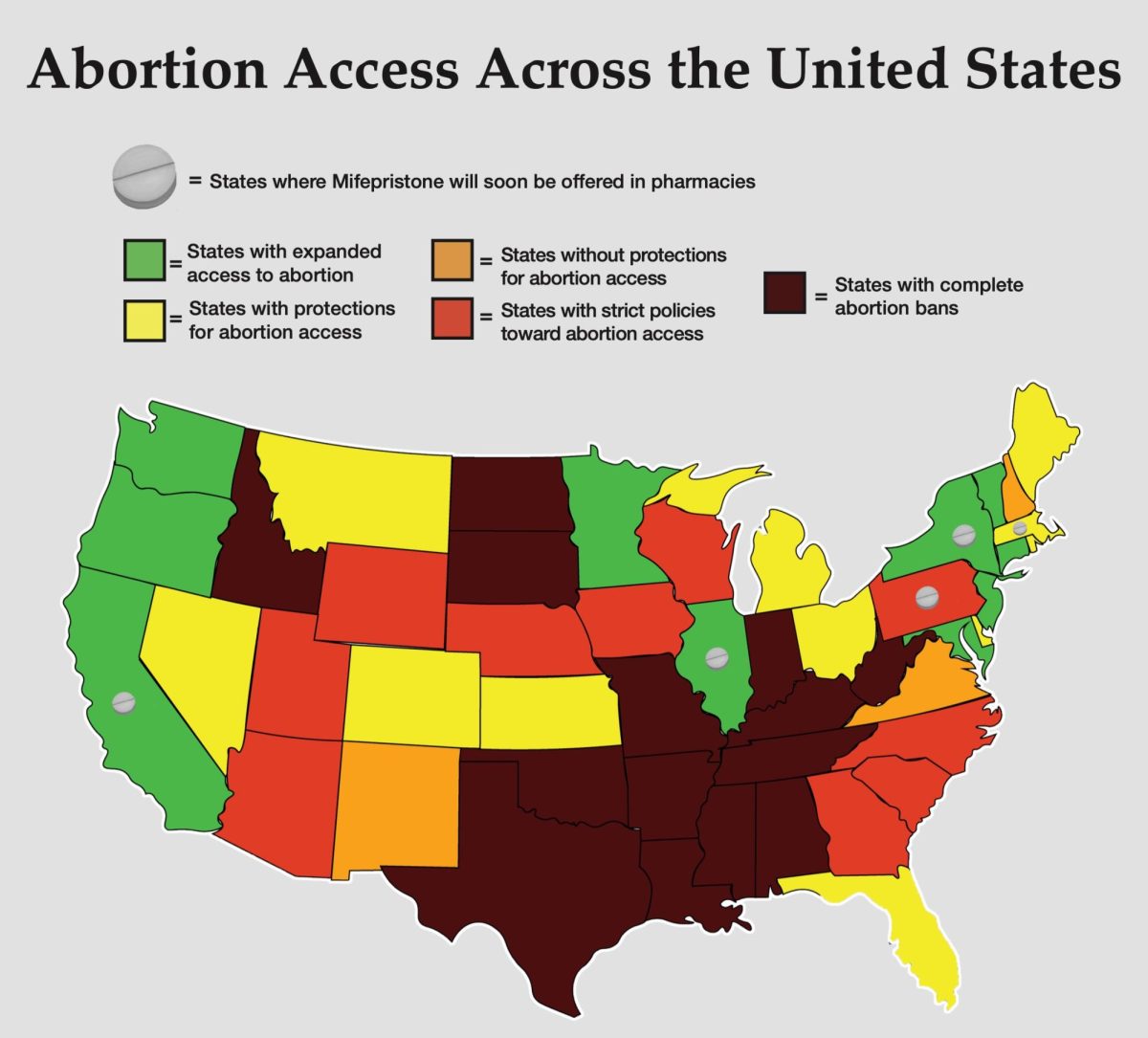Pharmaceutical store chains Walgreens and CVS announced on March 1 that mifepristone, a pill used to help terminate pregnancy, will be available in select locations across various states beginning on March 1. These locations include the New York City area, providing members of the Fordham community access to the pill.
Mifepristone is intended to be taken in tandem with misoprostol, a medication meant to prevent stomach ulcers when digested alongside pain relief medications such as aspirin or ibuprofen. The pill acts as the first of a two-part regimen to induce a medical abortion. Mifepristone blocks progesterone, which is a necessary hormone for the pregnancy to develop. After 24-48 hours, misoprostol is taken to induce cramping and bleeding to empty the uterus.
Fordham students reacted positively to the change in how mifepristone is distributed by CVS and Walgreens, with some noting that they are hopeful this will increase access to non-invasive abortion procedures.
“I think it takes a very grave emotional toll on these women to have to go through these complicated steps and face stigma about their decision,” Nalini D’Souza, Fordham College Lincoln Center (FCLC) ’26, said. “So to have the option to take the pill in their own home is definitely a comforting change.”
D’Souza added that she hopes pharmacies selling the abortion pill in stores will provide more widespread access to purchase the pill in the backdrop of state policies curbing contraceptive access.
“As a woman of color, I think my community is worse off without easy access to abortion,” D’Souza said. “Especially with our government feeling entitled to dictate what happens to a woman’s body, it’s like a sense of ownership.”
Abortion accessibility remains a top issue for many women since the Supreme Court overturned Roe v. Wade in its landmark decision in Dobbs v. Jackson Women’s Health Organization in June 2022. This is an especially prevalent conversation in the context of the upcoming 2024 presidential election. Since the decision no longer protects access to abortion at the federal level, several states have gone back and forth regarding the legality of abortions in any form, including pills.
So far, 21 states have issued near-total bans on abortions, with others not having available clinics due to threats of violence and legal repercussions. Although New York has not legislated prohibitions on abortion in any form, students still think about the likelihood of accessibility outside of the city.
“I feel like it could be potentially really difficult for me to get an abortion if I needed one,” Mara Vasil, Gabelli School of Business at Lincoln Center ’26, said.

Fraser Engerman, a spokesperson for Walgreens, told The New York Times that the company anticipates beginning distribution with select pharmacies in New York, Pennsylvania, Massachusetts, California and Illinois in the next week before launching in other states to ensure the well-being of patients and their providers.
Although the pill has been approved by the Food and Drug Administration since 2000, it is estimated that it will only be distributed in about half of the states based on their current regulations on abortions.
“If there is limited access to abortion resources, then more women are going to turn to harmful ways to self-induce an abortion,” Vasil said. “Having that option and choice is safer for women.”
Some students felt more efforts could be made to improve accessibility to contraceptives.
Mila Grgas, FCLC ’24 and president of the Feminist Alliance at Lincoln Center, said that while the pharmacies selling the drug are important, their efforts still fall short of ensuring contraceptive access to women across different communities and regions.
“There needs to be legal protections in place for people who can become pregnant and women specifically,” she said. “Anything less than that is a ploy to make it seem that we are moving in the right direction when things have only been becoming increasingly more dangerous for women.”
According to the New York Times, CVS announced they will not be distributing the medication through postal service. Walgreens, however, has noted that several of their pharmacies will allow the pill to be delivered via mail courier service. It will be available for both pharmacies with a doctor’s prescription. Both chains will act according to federal and state regulations when determining the proper distribution of mifepristone.
The CVS located at 1 Columbus Plaza, two blocks down from Fordham Lincoln Center’s campus, will be one of the local carriers of mifepristone in the coming weeks.



